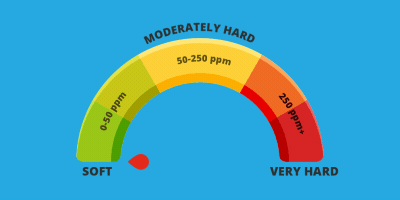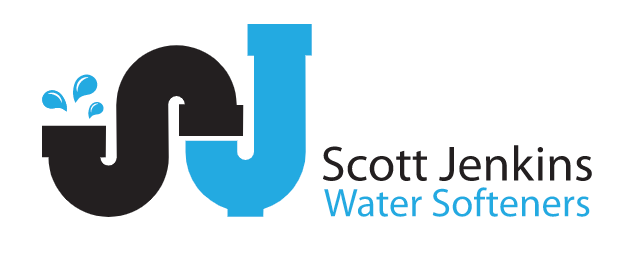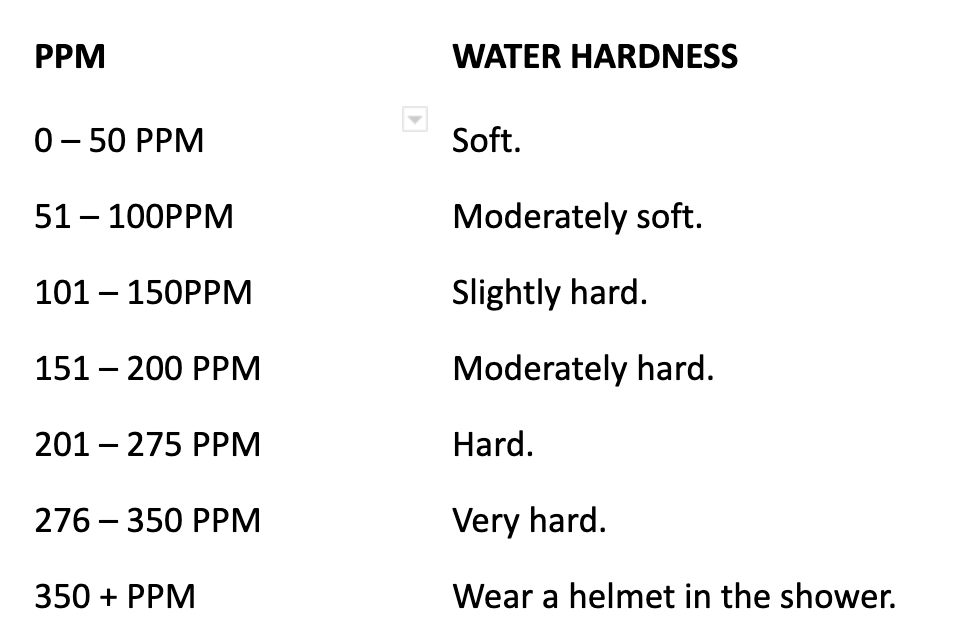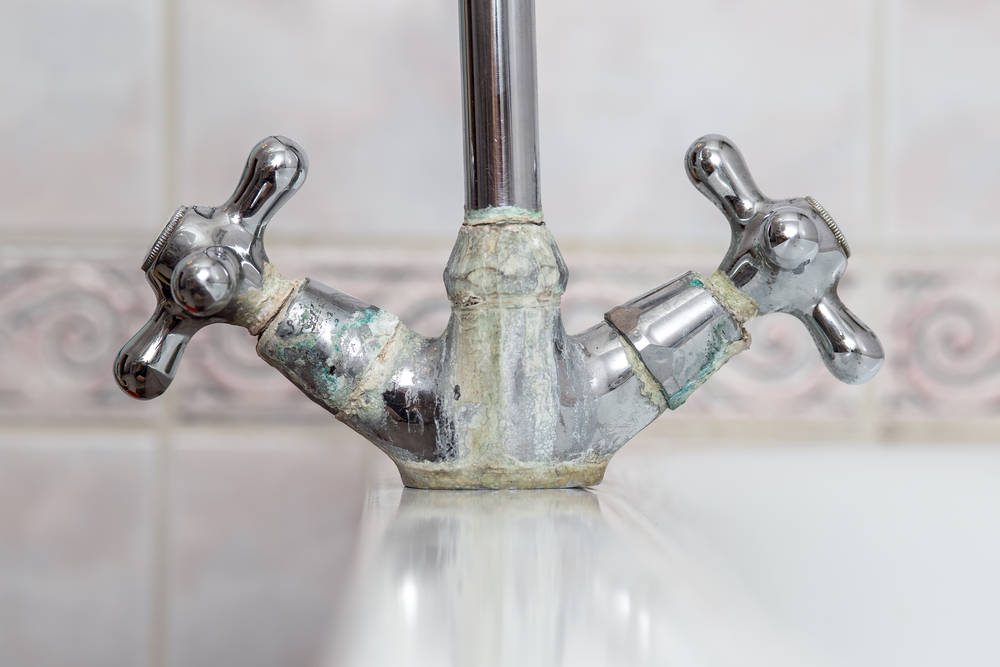How hard is the water in London?

For residents of London, it’s a fact of life that mains water is hard
London has always been subjected to hard water – ever since it started raining! Why? Well, it’s really all down to the lie of the land. The fact is that water doesn’t start out as being hard. Indeed, rainwater is naturally soft. However, when it comes into contact with the soil, it undergoes change. Like much of the south of England, London’s underlying soil contains plenty of chalk and clay. This type of soil is full of minerals like calcium and magnesium. When the rainwater is absorbed by this mineral rich underlay, it has the effect of turning the soft rainwater hard.
Although London’s water hardness levels differ from borough to borough, the average for London as a whole is 293 parts per million (ppm). This represents the amount of calcium carbonate in each litre of water. In a recent study, Epping (370ppm) and High Barnet (347ppm) were found to have the hardest water in the capital.
To put these figures in context, any reading over 200ppm is considered to be hard water. If it reaches 300ppm then it’s time to think about wearing a tin hat when you step into the shower. So, London’s water is exceptionally hard most of the time.
The best way to stop being constantly exposed to hard water is to have a water softener installed in your home. Given the extremes of London’s water hardness, it’s no surprise that huge numbers of London residents choose to have water softeners fitted. It makes a dramatic difference. A reading of 293ppm without a soft water system will be reduced to virtually zero with a water softener working its magic!
Mains Drinking Water and Sewerage Services in London
The mains water and sewerage services for London are under the control of Thames Water.
Do you live in London? Discover the hardness levels in areas near you:
Why is hard water a problem?
Although, there is nothing fundamentally bad about hard water – some people find it better to drink rather than soft water – for most of the time, there are plenty of reasons why it is best to stay clear of hard water if at all possible. Which brings us onto the subject of limescale.
The problem with limescale is that you can’t get rid of it all the time you are using a source of hot water. The build-up of scale occurs whenever hard water molecules are agitated. Basically, this happens every time water is boiled or heated in your household appliances, e.g. the boiler that controls your central heating, as well as your washing machine, dishwasher or kettle. In short, any time you are cooking, cleaning, washing and putting on the heating, the effects of hard water will become evident.
How is water hardness measured?
Water hardness is measured in particles per million (PPM). The amount of hardness particles that are dissolved in the water are rated, as follows:
In London, the mains water supply is classed as very hard for the majority of homeowners.
How can I reduce the water hardness in my home?
The most effective way to overcome the negative effect of hard water is to have a domestic or commercial water softener installed, whether in your home or business premises. That said, if you prefer to drink hard water, you could opt to leave your drinking water unsoftened. For example, it’s really easy to have a water softener fitted but still have a tap from which you can source hard water for drinking. This means you can filter out your drinking water supply from the bulk of the water from the mains supply which has gone through the water softener.
What is a water softener and how does it work?
Your water softener is attached directly to the mains water supply. It basically works by flushing out the hard water particles, a process which is known as “ion exchange”. This removes the calcium and magnesium minerals which make water hard in the first place and which are especially commonplace throughout London and the south-east.
The high-quality softeners we install at SJ Water Softeners contain food-grade resin beads that are dosed with sodium ions. As the water passes through the softener’s tanks, these resin beads attract and grab hold of the calcium and magnesium minerals and “exchange” them for sodium ions. This is the process that makes the water soft, once and for all removing the threat of limescale build-up in your household appliances and the issues associated with hard water on the body.
After a period of time, your water softener will need to “regenerate”. This is the process of flushing away the magnesium and calcium ions that build up in the resin beads. The more water you use, the more frequent the need for regeneration. You don’t have to worry about when this will take place – it happens automatically due to the efficiency of SJ Water Softeners’ products! A metering system tells the water softener when it’s time to regenerate. All you need to do is make sure the soft water system is regularly replenished with salt, which all water softeners need during the regeneration process.
The benefits of soft water on your skin, hair and laundry
Skin, hair and laundry absolutely love soft water! It makes your skin and hair feel smoother and silkier, plus you’ll quickly notice that your soaps, shampoos and gels will all last that much longer.
And, from first-hand experience, we know that skin conditions, such as eczema and dermatitis, respond really well to regular soft water exposure.
Also, your laundry will be softer to the touch, sinks and shower screens stay cleaner for much longer and they won’t look stained. Your household appliances will also run much more efficiently. Plus, you won’t get through as much Cif or Mr Muscle because you won’t be facing a constant battle against hard water!
Will my water softener need to be serviced?
To be on the safe side, servicing always makes good sense – for a variety of reasons. Even though, our water softeners are well-built, known for their reliability and designed to last for many years, they work best when well maintained. For this reason, we would always recommend you take out one of our Annual Service Plans.
What does the SJ Water Softeners Annual Service Plan include?
This is a once-yearly health check to ensure your water softener is functioning optimally. We’ll check there are no leaks, that the resin is given a good clean – this is very important – and that everything is in order with the working parts, like the bypass valves. We’ll also check that the overflow is cleared of any blockages.
Being on our annual service plan won’t just prolong the life of your water softener – it will also save you any outlay on unexpected maintenance issues.
What’s more, you don’t need to be an existing SJ Water Softeners customer to benefit from an Annual Service Plan.
Other Annual Service Plan benefits – Warranties, Parts, Salt
- Save money on any parts that need replacing, such as filters – we’ll take £10 off the standard price of a replacement. Plus, we will give you a 10-year warranty on all parts – as opposed to the standard manufacturers’ warranty you’d otherwise receive.
- Reduced cost of salt supplies. When we do your yearly Health Check, we’ll stock you with sufficient salt to last until your next annual inspection – saving you money on bulk purchases and on delivery charges.
- Sign up for a plan and get a free faucet and filter (worth £120)
The whole Annual Service Plan Package costs just £65.00, inclusive of VAT.
London– an Overview
Annual rainfall: 21.94 inch or 557.4mm.
Wettest month – October – 2.4 inch or 61.1mm
These averages are based on data accumulated over the last 30 years.
London is both the capital and largest city within both the UK and England itself. Situated on the River Thames, it stands at the head of a 50-mile estuary which leads into the North Sea. Given its strategic and geographical position, London has been a major settlement for over 2000 years. The City of London, its ancient core and financial centre, was founded by the Romans. Greater London also includes parts of Surrey and Kent to the south. For centuries, the City of Westminster, to the west of the City of London, has held the national government and parliament.
With a population of around 9 million, London is one of the largest in Europe and one of the world’s great financial centres. In 2017, its GDP made it the Europe’s biggest urban economy. The city is home to the most 5-star hotels in the world and, in 2012, London became the first city to host three Summer Olympic Games.
London has four World Heritage Sites: the Tower of London; Kew Gardens; the combined Palace of Westminster, Westminster Abbey and St Margaret’s Church; and also historic Greenwich, where the Royal Observatory is housed. Other landmarks include Buckingham Palace, the London Eye, Piccadilly Circus, St Paul’s Cathedral, Tower Bridge and Trafalgar Square. The London Underground is the world’s oldest rapid transit system.
What’s the big issue with limescale?
The constant use of hard water in the home lays you open to limescale and a multitude of problems, any one of which could seriously downgrade your household appliances and hit you financially.
- Overall reduced efficiency of appliances
- Potential for boiler breakdowns
- Block valves, reduced diameter of pipework
- Unnecessarily high gas and electricity bills
- More time needed for household cleaning
- Dull and stained surfaces, like chrome, granite, glass, Perspex, etc
Hard water is bad news for skin, hair and laundry
You might not realise it, but hard water can have a big impact on personal hygiene. Regular washing in hard water will dry out your skin and it can be especially bad for anyone affected by skin conditions, like eczema. Also, with continued exposure to hard water, hair will look lifeless after shampooing, whilst the colour and softness will disappear from laundry. If your towels feel starchy after coming out of the washing machine, that’s down to hard water! The more you clean, the worse the problem gets.
The effects of hard water on skin, hair and laundry
Hard water is also a big issue for personal hygiene. It dries out your skin and can be especially bad for those suffering from skin conditions, like eczema psoriasis. Hair can look lank after shampooing and your laundry will lose its softness and feel starchy and lifeless, when frequently exposed to hard water. The more you clean, the worse the problem becomes.
A Water softener and Energy efficiency go together
With every passing year, the average London household that isn’t equipped with a water softener will see a sharp reduction in energy efficiency. And given the rising cost of energy bills, this isn’t what you would want to hear! It’s all because of the build-up of limescale in the plumbing. Annually, you can expect limescale accumulation of up to 1.5mm in pipework – or even worse in very hard water areas, such as London. This level of build-up reduces energy efficiency by as much as 12% a year. And with every passing year, energy efficiency will keep getting worse, whilst the fuel bills just keep increasing. Not a good position to be in!
The good news is that you can enjoy big savings on fuel costs with a water softener in situ. What’s more, the reduced capital depreciation on your household appliances could save you as much as £240 a year. Plus, your central heating boiler will function much more efficiently and last a lot longer – easily 15 years – before you’d even need to think about getting a new one.
What does it cost to run a water softener?
Whilst most of the water softeners we fit don’t have many moving parts, are extremely reliable and highly unlikely to break down, there are associated servicing costs. For this reason, we would recommend that you have a cost-effective Annual Health Check.
Typically, the only on-going cost you would need to consider is for block salt. This will cost no more than £2 to £7 per person per month, depending on the capacity and amount of usage your water softener gets.
What is the best water softener for me?
Our market-leading selection of Kinetico and EcoWater softeners are designed to suit all requirements and UK plumbing systems. We can discuss the best option for you, based on your budget and anticipated usage. Our ranges start from £1595 for the premium range.
The installation cost is £350 for all models connected to the most common 15-22mm pipework. For 28mm pipework, the price may go up to £450, although we’ll assess this when we visit. And there’s no need to do a site visit prior to installation – we can do both on the same day. The prices you see on the website are definitive and VAT inclusive.
If you aren’t sure which is the right softener for you, by answering these few short questions you’ll be on the right track. Or call us if you have any questions.


